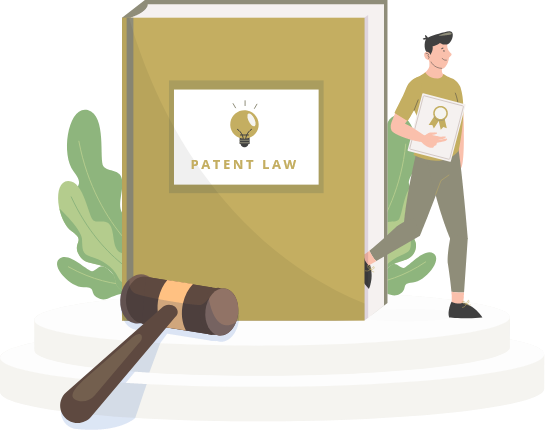
Patent Your Invention: Protect Your IP
A patent is a form of intellectual property that gives the holder exclusive rights to prevent others from making, using, or selling an invention for a specific time, usually 20 years from the filing date.
By obtaining an invention registration, clients can gain a competitive advantage in the marketplace by preventing others from using their inventions. It also provides legal protection and can help attract investment and licensing opportunities. We offer Patent search, filing, Examination, pre-grant & post-grant services, Registration, PCT filing, foreign filing license, and Litigation services.
The Indian Patent Office administers the Patents Act, of 1970 governs in India. An invention must be new, involve an inventive step, and have an industrial application receive an invention protection grant. Excluded from patentability are inventions contrary to public order or morality, methods of agriculture or horticulture, and computer programs. Registered inventions can include new products, processes, machines, and compositions of matter, but not methods of medical treatment or surgery. It provides a competitive advantage and protects intellectual property rights.

Our Services
DSA provides a broad range of services for Patent search, PCT filing, pre/post-grant, Examination, registration, and Litigation. We ensures that clients receive top-notch legal counsel and guidance.
Patent search( freedom to operate)
To avoid legal disputes and financial penalties for infringing on existing registered designs, conducting a patent search is a critical step that is highly recommended before launching a new product or entering a new market. By utilizing various databases and search tools, we can identify existing registered designs that may affect the owner's ability to operate freely. Therefore, it is essential to prioritize this step as part of any product development or market entry strategy.
Patent Filing
Patent filing is the legal process of obtaining a registered design for an invention or product. It protects intellectual property rights and involves submitting a detailed invention protection application that meets legal requirements. Filing should occur before public disclosure to retain the right to an invention registered. The application includes specifications, drawings, and other necessary documents.
Examination
Patent examination ensures that applications meet legal requirements for patentability. This thorough review includes prior art to determine if the invention is new, non-obvious, and has industrial applicability. The examiner may issue a report identifying issues that the applicant can address. Intellectual property offices conduct the examination, which can take several months to years based on complexity and workload.
Pre-Grant & Post-Grant
The pre-grant stage occurs between patent application filing and grant, conducting a search and application drafting to ensure legal conditions are met. Post-Grant refers to the period after a patent grant, where legal challenges such as opposition or invalidation may occur. Our firm assists clients in enforcing rights or defending against challenges, and timing varies depending on jurisdiction and complexity.
Patent Registration
PCT filing streamlines the process of seeking patent protection in multiple countries with a single international application. It involves filing, conducting a search, publishing, entering into national phases, and prosecuting the application in each country. PCT filing reduces costs, delays the decision on where to file, and streamlines the process.
PCT filing of patent
PCT filing streamlines the process of seeking patent protection in multiple countries with a single international application. It involves filing, conducting a search, publishing, entering into national phases, and prosecuting the application in each country. PCT filing reduces costs, delays the decision on where to file, and streamlines the process.
Patent Litigation
Patent litigation enforces patentee rights and seeks damages when their patent rights are violated. The process includes investigation, filing the lawsuit, discovery, trial, and appeals. Due to the complexity and cost of litigation, it's important to consider potential outcomes before pursuing it. The outcome varies from injunctions to damages.
Frequently Asked Question
In general, inventions that are new, useful, and non-obvious can be patented. This can include machines, processes, compositions of matter, and new or improved designs.
Patents are territorial rights. In accordance with the law of that country or region, the exclusive rights are only applicable in the country or region in which a patent has been filed and granted.
No, patents cannot be renewed in India. The duration of a patent is fixed at 20 years from the date of filing the application.
To apply for a patent, you must file an application with the Indian Patent Office, accompanied by the appropriate fee. You can file with either a provisional specification or a complete specification. If you file with a provisional specification, you must file a complete specification within 12 months. There are no extensions beyond this period.
Yes, it is necessary to disclose all prior art while applying for a patent in India. This includes any existing patents or publications that are relevant to the invention.
A provisional application can be filed to establish a priority date for an incomplete invention. It also allows time for the applicant to assess the market potential before filing a complete specification. However, it is not important to file with a provisional specification, and you can apply directly with the specification.
Patent infringement occurs when someone makes, uses, sells, or imports an invention that is covered by someone else's patent without the patent owner's permission. This can lead to legal action, including damages and an injunction to stop the infringement.
Yes, a patent can be transferred or licensed in India through a written agreement between the original patent owner and the transferee or licensee.
At Dhairya Shah & Associates, we specialize in offering complete invention protection services in India, which cover everything from patent drafting to filing and prosecution. Our team of seasoned professionals is dedicated to safeguarding your inventions and innovations with thorough protection. Get in touch with us now to secure your invention protection rights today.






